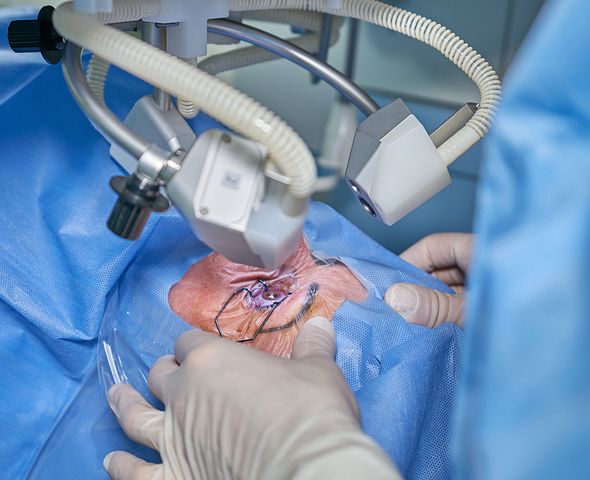Astigmatism is caused when the cornea or lens of the eye is slightly deformed. This condition is more common than you think and can affect people of all ages, but more typically older people.
Doctors are unsure of why the shape of the cornea or lens differs from person to person, but many people are unaware that the development of astigmatism is often hereditary.
Though, the notion that reading in low light or sitting too near television can cause or worsen astigmatism is completely baseless.
What is Astigmatism?
Typically, the front part of the eye is circular in shape, and it helps in the concentration of light rays onto the retina, which helps us see things clearly. Light rays do not refract properly as they enter the front of the eye in people who have astigmatism.
Light rays can fall short of or go past beyond the retina, causing hazy vision at close and vast distances. Individuals with astigmatism may also have additional refractive problems.
What Is Photorefractive Keratectomy?
Photorefractive keratectomy is a form of refractive surgery offered by Lasik eye surgery Illinois. A laser is utilized to correct astigmatism. Your eye doctor will use this laser to change your cornea’s shape during PRK, to enhance the focus of light rays on the retina.
PRK is a treatment for multiple eye conditions such as myopia, hyperopia, and astigmatism. Photorefractive keratectomy aims to improve your vision by rectifying these conditions, including astigmatism. PRK can help get rid of the need for glasses or contact lenses, and it may be possible to do without them entirely after a successful procedure.
When Do You Need PRK?
PRK is a viable option for people who are prone to having dry eyes or whose corneas are thin, but you wish to undergo a corrective surgery but are not fit for LASIK. Additionally, if you lead an extremely active lifestyle or work, PRK may be better than LASIK or similar treatments because PRK isn’t as invasive or complex as LASIK and other eye-related procedures.
Some people who have had lenses implanted in their eyes following cataract surgery may benefit from PRK for astigmatism to improve their eyesight as well.
How Does PRK Work?
PRK is typically performed as an outpatient procedure, and the procedure itself takes around 15 minutes. Your eyes will be numbed using eye drops to prevent any discomfort, and an eyelid holder will be placed on your eye to prevent you from blinking during the procedure.
An ophthalmologist will then remove the outer layer of your cornea. During this time, you must focus on light and try not to shift your eyes. The eye doctor will then use a laser to reshape your cornea. A laser is a specialized tool that has been configured with the measurements of your eye. You will hear a clicking sound when your ophthalmologist is using the laser, but you will most likely not feel anything.
Benefits of PRK for Astigmatism
Your vision is critical to your overall quality of life. Astigmatism can be improved with PRK, and there are several other benefits that come with ICL eye surgery near me.
PRK is Suitable for Those Who Have Thin Corneas
For some patients, PRK is the only laser eye surgery alternative available, as other eye surgeries may not be an option for them if you have thin corneas. PRK also corrects all types of refractive problems, including short- and long-sightedness and astigmatism.
Appropriate For People Who Need Stronger Prescriptions
The higher your prescription, the more corneal tissue your eye surgeon will have to remove. This is why people with thin corneas who require extensive correction may find PRK is a better alternative to other procedures that they may not qualify for.
Decreased Chance Of Infection Or Dry Eye
Because PRK is less intrusive than other procedures, it has a decreased risk of infection and does not interfere with the usual watering of the eye. This reduces the likelihood of feeling dry eye, which is a common symptom after LASIK.
Contact Free Procedure
Previous to TransPRK, all laser eye surgery treatments needed some device to connect with the eye. TransPRK is performed the same way as traditional PRK, except there is no suction, blades, or alcohol that comes in contact with the eye, which implies it is milder on the eyes as any form of contact can result in irritation and risks infection.
Cost-Effective Solution
PRK laser eye surgery is generally less costly than other laser eye surgery treatments. This is primarily due to PRK being the first and most widely available technique based solely on demand and supply economics.
Many people choose PRK Laser eye surgery because they believe it is the only technique that will fit their lifestyle, career, or budget. If PRK is chosen, it will provide comparable visual outcomes to other procedures at a lesser cost.
FAQs
What is the purpose of PRK?
Photorefractive keratectomy addresses refractive problems in your eyes, such as astigmatism. This technique enhances how light rays are focused on your retina by changing the curvature of your cornea using a laser.
What should you bring to the PRK procedure?
Patients are not required to bring anything to their PRK procedure; however, you may want to wear glasses rather than contact lenses to the procedure for convenience.
What is the duration of the PRK procedure?
The procedure of PRK lasts only 10 to 15 minutes.
Will I be asleep during the procedure?
Throughout the PRK process, you will be awake, but to ensure that you are comfortable throughout the procedure, your surgeon will administer eye drops to numb your eyes.
When will I be allowed to return home following the PRK procedure?
After the PRK, you’ll be allowed to go home right away. You should, however, have someone drive you as your eyes may be sensitive to light post-procedure.
Is PRK a painful procedure?
No. Your eyes will be numbed, so you will not feel anything during the PRK procedure. You may experience some slight pain for a few days following the surgery.








